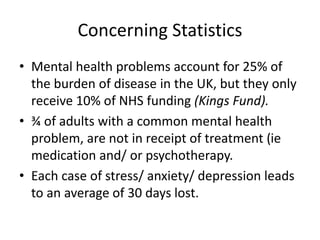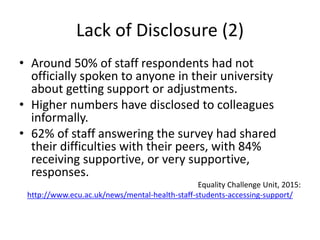Transforming Mental Health
- 1. AUA Manchester 2017 Session 214 Transforming Mental Health James Craig FAUA (Ex-University of Leeds) Retired – Writer/ Campaigner
- 2. Chatham House Rules • Any personal mental health issues we share with others, must be strictly “within these four walls.” • Ditto if referring to colleagues when talking to others. • Purpose, though, is to talk, listen, and share best practice to take back to our Institutions
- 3. Effects on People/ Stigma • Mental health can impact considerably on work, relationships and quality of life generally. • Everyone’s experience is different. (Two people with the same condition may have entirely different symptoms and coping mechanisms) • We are all individuals (no “one size fits all”) • There does remain a stigma (reluctance to disclose/ shame/ fear/ scepticism) • “Elephant in the Room”
- 4. Equality Act 2010 • A mental health condition is considered a disability if it has a long- term effect on your normal day-to-day activity. This is defined under the Equality Act 2010. • Your condition is ‘long term’ if it lasts, or is likely to last, 12 months. • ‘Normal day-to-day activity’ is defined as something you do regularly in a normal day. This includes things like using a computer, working set times or interacting with people. • If your mental health condition means you are disabled, you can get support at work from your employer. • There are many different types of mental health condition which can lead to a disability (see later slide). https://www.gov.uk/when-mental-health-condition-becomes-disability -Updated 5th April 2017
- 5. Non-discrimination • If you’re in employment and become disabled, your employer can’t discriminate against you because of your disability - you’re protected by the Equality Act 2010. • They must also keep your job open for you and can’t put pressure on you to resign just because you’ve become disabled. https://www.gov.uk/if-you-become-disabled/if-youre-in-employment-and- become-disabled
- 6. ‘Reasonable Adjustments’ Your employer must make ‘reasonable adjustments’ for you so that you’re not disadvantaged compared to non-disabled people. This could include: • a phased return to work – eg working flexible hours or part- time • time off for medical treatment or counselling • giving another employee tasks you can’t easily do • providing practical aids and technical equipment for you https://www.gov.uk/if-you-become-disabled/if-youre-in-employment-and- become-disabled
- 7. Dismissal and Redundancy • Your employer can’t dismiss you just because you’ve become disabled. • You can be dismissed if your disability means you can’t do your job even with reasonable adjustments. • You can’t be selected for redundancy just because you’re disabled. https://www.gov.uk/if-you-become-disabled/if-youre-in-employment-and- become-disabled
- 8. Mental Health Conditions – Excessive and prolonged stress, is very common in the HE sector. – Various other factors and causes can come into play too. – Emphasise (again) that we are all different - no one size fits all. • Depression • Anxiety • Panic attacks • Obsessive-compulsive disorder (OCD) • Phobias • Bipolar disorder (“manic depression”) • Schizophrenia • Borderline Personality Disorder (BPD) • Psychosis • Dementia
- 9. Concerning Statistics • Mental health problems account for 25% of the burden of disease in the UK, but they only receive 10% of NHS funding (Kings Fund). • ¾ of adults with a common mental health problem, are not in receipt of treatment (ie medication and/ or psychotherapy. • Each case of stress/ anxiety/ depression leads to an average of 30 days lost.
- 10. Work and non-work causes • Often a combination of work/ non-work • 20% of respondents stated down to “non-work issues” CIPD Employee Outlook, 2011 • 70% of employee mental health problems are either directly caused by work, or by a combination of work and home CIPD/ Mind, 2011
- 11. Yawning Gap “In spite of the growing awareness of health and wellbeing within organisations, there remains a yawning gap of ignorance regarding the impact of employees’ physical state on their performance”. Concilio Health
- 12. Employer’s Responsibility The cost to an organisation in terms of reduced productivity as a result of employees with poor mental health working sub-optimally, is estimated to be three times the cost of mental health related sickness absence. (Centre for Mental Health) It is therefore in an organisation’s best interests (ie improved performance), to work proactively in creating conditions for employees to be in the right physical and mental state at the outset, rather than trying to avoid negative outcomes (Prevention better than cure).
- 13. Positive Employee Engagement “It is…impossible to disentangle the impact of various factors on mental health and so it is in employers’ interests to actively support staff with mental health problems, whatever the original cause or trigger. The wider knock-on effects for the employer are also significant, as positive employee engagement means staff feel valued and are more likely to go the extra mile for the organisation” CIPD/ Mind, 2011
- 14. “Positive employee engagement……….” What does that mean? Does it mean…..
- 15. Support Structures (common) • HR department / HR staff? Staff satisfaction surveys? • Occupational Health/ University Medical Officers? • Staff development unit (delivering, eg, leadership and management programmes)? • ‘Investors in People’ certification? • Unions?
- 16. More Support Structures • Professional counselling service • Courses in, eg, mindfulness (becoming trendy) • Formal mentoring and buddy scheme • Staff benefit packages (eg salary sacrifice schemes) to help improve wellbeing
- 17. Support Structures; or Lip Service? • Good managers and well-run units exist even in poorly-run large organisation. • Stress/ pressures on HEIs from the external environment…. • .…and from within: Academics vs Administrators (Arsenal vs Bayern Munich?) • Academics vs Academics • Administrators vs Administrators • What does all this ‘vs’ say about organisational culture, and even about basic ethics?
- 18. Tackling the causes • We do need the basic structures and expert staff, but much else besides… • “Effective managers help employees to manage their workloads, create opportunities for coaching and learning, and promote a culture of open dialogue – all of which help to boost staff mental wellbeing and employee engagement levels.” Mind
- 19. Three-pronged approach (Mind) 1. Promoting wellbeing for all staff 2. Tackling the causes of work-related mental health problems 3. Supporting staff who are experiencing mental health problems
- 20. 1. Promoting wellbeing • Getting senior leaders on board (mental health issues explicitly in the Institutional Strategy – wellbeing- motivation/ performance) • Raising awareness of mental health and wellbeing (challenging the “elephant in the room” at every level) • Induction; training; champions • Involve staff in dialogue and decision-making • Culture of openness / two-way communications • Work/ Life Balance • Peer support, buddies, mentoring • Positive working relationships
- 21. 2. Tackling the Causes • ‘Taking stock’ of your colleagues’ mental wellbeing • Embedding mental health explicitly into all staff policies. Promote awareness. • Training for line managers to include mental health and stress management at the heart. • Regular one-to-ones. Open management. Be available. • Treat people as people.
- 22. 3. Supporting staff who are experiencing mental health problems • Could there be a disconnect between Occupational Health (a medical professional who really does understand mental health), and a poor (or more correctly maybe an under-trained) line manager, who doesn’t? • Pulling in different directions • Disclosure…..
- 23. Lack of Disclosure (1) 50% of staff and students in UK universities with mental health difficulties are not asking for the help and support they may need out of lack of information or fear of receiving unfair treatment. Equality Challenge Unit, 2015: http://www.ecu.ac.uk/news/mental-health-staff-students-accessing-support/
- 24. Lack of Disclosure (2) • Around 50% of staff respondents had not officially spoken to anyone in their university about getting support or adjustments. • Higher numbers have disclosed to colleagues informally. • 62% of staff answering the survey had shared their difficulties with their peers, with 84% receiving supportive, or very supportive, responses. Equality Challenge Unit, 2015: http://www.ecu.ac.uk/news/mental-health-staff-students-accessing-support/
- 25. Early Signs/ Encouraging Disclosure • The situation of a colleague who has a mental health issue and who is seriously under-performing, can have serious consequences for the rest of the team. • Early conversation – broaching the subject - can be difficult. • Reluctance to talk on the part of the person who is depressed etc. • Conversation skills in a neutral place: open questions; non-judgmental; eye contact; calmness; empathy; avoid making assumptions; follow up in writing.
- 26. Rehabilitation • Mental Health Champions (eg Deloitte) • Wellness Recovery Action Plans (WRAPS) • ‘Reasonable Adjustments’ (Disability Act 2010) - and more • Return-to-work interviews
- 27. Mental Health Champions • Deloitte • A few company partners who have been specially trained. • Employees may approach these people outside the line management structures • Clear signal from the top, that employees can be open
- 28. Wellness Recovery Action Plan (WRAP) • Employee-driven • Bespoke • Practical, mutually-agreed steps • Details the following: signs/ symptoms; triggers for distress; what support can help; emergency contact • Packages - eg free access to University sports facilities for a given period
- 29. ‘Reasonable Adjustments’ • Disability Act 2010 – legal compliance should be the bare minimum • “…if the cost of making adjustments is anything up to the cost of recruiting and training a new employee, this is reasonable” (Mind) • Practical implications of any reasonable adjustment request • See what goes on, from both sides • Bespoke/ apply to all staff, whether or not they have had a formal diagnosis?
- 30. Return to Work Interviews • Trust and engagement • Role of Occupational Health • Role of Unions (representative) • Tell people how much you missed them! • Open questions. Listen. Empathise • Open up about feelings • WRAP (see above)
- 31. Managing under-performance and mental health issues concurrently • Can be very tricky indeed • Time and sensitivity • Focus on the person; avoid making assumptions (eg is sickness absence genuine?) • Support & reasonable adjustment in place • Invite third party representation (eg a Union rep) at every stage
- 32. Suggestion for discussion (1) Is there anything you have experienced (whether yourself personally with a mental health difficulty, or knowing a colleague with a mental health difficulty), that could give cause to suggestions as to how you or your HEI might have handled a given situation, any better?
- 33. Suggestion for discussion (2) Have you any tips for resolving the tension between managing under-performance, and supporting a colleague during a period of disability caused by mental difficulty?
- 34. Suggestion for discussion (3) How can top management in your HEI, be persuaded to embrace practical, strategic measures that might be necessary, to bring into play some of the more ethical and cultural transformational changes described above? Or are they already “there”? If so what steps did they take to achieve those changes?
- 35. References (1) Mind: Mental Health at Work – Numerous valuable resources (must-reads): http://www.mind.org.uk/workplace/mental-health-at-work/ (Tip: Follow Mind on LinkedIn) Mind/ CIPD – Managing and supporting mental health at work: disclosure tools for managers (must-read): https://www2.cipd.co.uk/publicpolicy/policy-reports/mental-health-work- disclosure-tools.aspx Concilio Health – Dr Sarah Hattam (GP) with a very strong focus on the need to transform workplace health: http://www.conciliohealth.com/about/
- 36. References (2) NICE ‘Healthy workplaces: improving employee mental and physical health and wellbeing’ (Quality Standard QS147): https://www.nice.org.uk/guidance/qs147 Equality Challenge Unit: Mental Health in HE: Staff and Students not accessing support: http://www.ecu.ac.uk/news/mental-health-staff-students- accessing-support/ Centre for Mental Health (formerly the Sainsbury Centre for Mental Health) https://www.centreformentalhealth.org.uk/ Deloitte – Mental Health Champions http://www.deloitte.co.uk/impact/2012/case-studies/mental-health- champions/



































